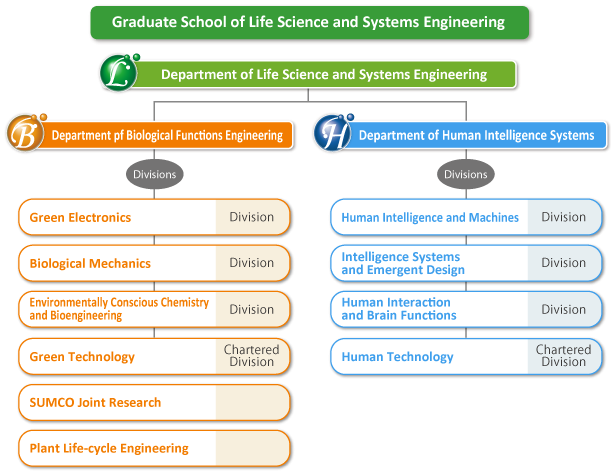
Distinguishing Features of the Graduate School
The basic objective of this graduate school is the education and development of engineers and researchers capable of elucidating the structures and functions of living organisms for resource and energy saving, environmental symbiosis, human affinity, and other properties, and to develop their technological utilization.
To achieve this goal, under the masters program, its Department of Biological Functions Engineering applies the superior functions of organisms to the solution of problems and needs that confront society, and its Department of Human Intelligence Systems develops the skills and capabilities for building an optimum society of ease and comfort in a world of complex intelligence-body-environmental systems.
On the other hand, under the doctoral course of obtaining specialization in the life science and systems engineering field, focus is directed towards the promotion and intensification of cross-specialization and global education. The school is accordingly dedicated to the development of professionals that are constantly focusing on the emerging trends in research and technology and working to achieve innovation and advances.
The school, in short, is dedicated to the development of globally oriented professionals who can work with society to meet the needs and solve the problems that confront it today and contribute to a sustainable and harmonious future.
Distinctive Educational Objectives
The underlying goal is the development of new areas of advancement in the fields of mechanical, electronic, chemical engineering, and information technologies and in life sciences along with other disciplines, through technological application of the superb structures and functions of many organisms.
Education and training at this graduate school is directed toward the development and mastery of the following areas.
- To achieve a high level of expertise and knowledge together with a strong awareness of their important roles as technocrats of life science and systems engineering.
- Understanding the role of each specialized area of life science and systems engineering to meet the needs of society.
- Capability and competence in the logical analysis and solution of problems and the attainment of objectives.
- Skills and competence necessary for effective presentation and introduction of new technologies and innovations.
- Skills and competence in accurate communication based on logical thoughts.
- Capability for both independent and collaborative proposal, consideration, and implementation of solutions to problems and tasks in fields of specialization.
Basic Content of Education and Research
Living organisms perform motor neuron control and movement together with their transformation of materials and energy. Elucidation of these processes requires systematic research into their structures, materials and energy transformation, sensing, motility, control, information processing, and other salient aspects, in addition to the existing techniques and methods of life science at the molecular and cellular level.
The underlying purpose and goal of the Graduate School of Life Science and Systems Engineering is to ensure students master the knowledge, technologies, and skills needed to achieve a technological understanding of these multifaceted functions of living organisms as comprehensive systems.


